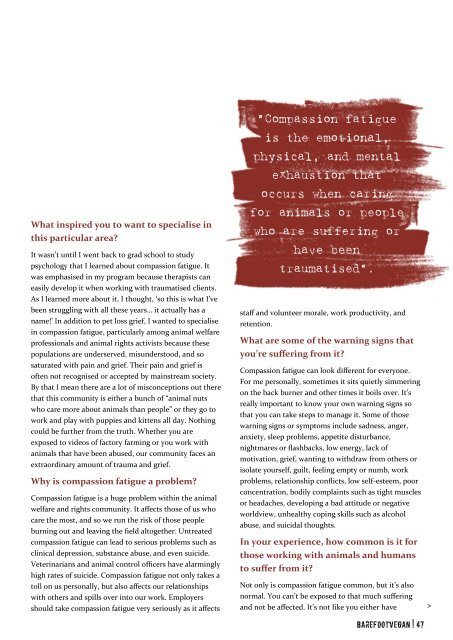Barefoot Vegan Mag Jan_Feb 2017
Create successful ePaper yourself
Turn your PDF publications into a flip-book with our unique Google optimized e-Paper software.
“Compassion fatigue<br />
is the emotional,<br />
physical, and mental<br />
exhaustion that<br />
occurs when caring<br />
What inspired you to want to specialise in<br />
this particular area?<br />
It wasn’t until I went back to grad school to study<br />
psychology that I learned about compassion fatigue. It<br />
was emphasised in my program because therapists can<br />
easily develop it when working with traumatised clients.<br />
As I learned more about it, I thought, ‘so this is what I’ve<br />
been struggling with all these years… it actually has a<br />
name!’ In addition to pet loss grief, I wanted to specialise<br />
in compassion fatigue, particularly among animal welfare<br />
professionals and animal rights activists because these<br />
populations are underserved, misunderstood, and so<br />
saturated with pain and grief. Their pain and grief is<br />
often not recognised or accepted by mainstream society.<br />
By that I mean there are a lot of misconceptions out there<br />
that this community is either a bunch of “animal nuts<br />
who care more about animals than people” or they go to<br />
work and play with puppies and kittens all day. Nothing<br />
could be further from the truth. Whether you are<br />
exposed to videos of factory farming or you work with<br />
animals that have been abused, our community faces an<br />
extraordinary amount of trauma and grief.<br />
Why is compassion fatigue a problem?<br />
Compassion fatigue is a huge problem within the animal<br />
welfare and rights community. It affects those of us who<br />
care the most, and so we run the risk of those people<br />
burning out and leaving the field altogether. Untreated<br />
compassion fatigue can lead to serious problems such as<br />
clinical depression, substance abuse, and even suicide.<br />
Veterinarians and animal control officers have alarmingly<br />
high rates of suicide. Compassion fatigue not only takes a<br />
toll on us personally, but also affects our relationships<br />
with others and spills over into our work. Employers<br />
should take compassion fatigue very seriously as it affects<br />
for animals or people<br />
who are suffering or<br />
staff and volunteer morale, work productivity, and<br />
retention.<br />
What are some of the warning signs that<br />
you’re suffering from it?<br />
Compassion fatigue can look different for everyone.<br />
For me personally, sometimes it sits quietly simmering<br />
on the back burner and other times it boils over. It’s<br />
really important to know your own warning signs so<br />
that you can take steps to manage it. Some of those<br />
warning signs or symptoms include sadness, anger,<br />
anxiety, sleep problems, appetite disturbance,<br />
nightmares or flashbacks, low energy, lack of<br />
motivation, grief, wanting to withdraw from others or<br />
isolate yourself, guilt, feeling empty or numb, work<br />
problems, relationship conflicts, low self-esteem, poor<br />
concentration, bodily complaints such as tight muscles<br />
or headaches, developing a bad attitude or negative<br />
worldview, unhealthy coping skills such as alcohol<br />
abuse, and suicidal thoughts.<br />
In your experience, how common is it for<br />
those working with animals and humans<br />
to suffer from it?<br />
have been<br />
traumatised”.<br />
Not only is compassion fatigue common, but it’s also<br />
normal. You can’t be exposed to that much suffering<br />
and not be affected. It’s not like you either have ><br />
BAREFOOT<strong>Vegan</strong> | 47





